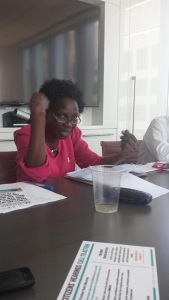“You are paid using our taxes from the garden and you also want me to buy a book” said a mother to a midwife who had asked her to buy a book were her medical information will be written since the health center had run out of stationery. This is one incident of disrespect to midwives that I have seen at a health facility in Lira among others, and this happens because of the gaps in the health system which affects the partnership between mothers and midwives. This mother’s response to the midwife left me dumbfounded but am certain it left the midwife very angry and I could have affected her attitude to all the other mothers seeking care.
The World Health Organisation states that every woman has the right to the highest attainable standard of health, including the right to dignified, respectful care during pregnancy and child birth but how do we attain this if the there is no relationship. Women who go to facilities for care may encounter disrespect in different ways but these problems are systemic and persist may be because; some providers lack awareness about patients rights, some are stressed and overworked because they are under staffed. This doesn’t necessarily mean it is okay for the disrespect to continue because of the above reasons, but how about we start with getting solutions like solutions like; increasing health worker force, updated and improved training , and with a good work environment. Mid wives will surely then provide respective, sensitive and effective maternity services to mothers.
As the world commemorates the International Day of the Midwife today, with the theme, ‘Midwives, Mothers and Families: Partners for Life!’, am thinking beyond partnership. I believe in partnership and this is by far one of the best partnerships, but with the continuous shortage of midwives in Uganda and other countries, who will mothers have this partnership with? How much time and attention is a midwife able to give to mothers if she is able to work? Midwives in most developing countries are overwhelmed but continue to serve because they want to see every mother happy as they bring new life to the world.
Midwives everywhere understand that working in partnership with women and their families, they can support them to make better decisions about what they need to have a safe and fulfilling birth. Shortage of midwives is not just the only problem and it is important to note that there is need to not only recruit and retain midwives but also fulfilling the needs of the health system. If needs like water, electricity, delivery kits, well equipped labor suites are not there, this greatly affects their attitude and might later affect the relationship or partnership we thought a midwife should be having with a mother.
I was excited when I got to know this year’s theme was on partnership because for last year’s International day of the midwife, I wrote about Pregnant woman – qualified midwife: The best partnership to reduce maternal deaths.
To all midwives thank you, ‘apwoyo atek’, ‘mwebale nyo’, yalama noi …….!!!!


